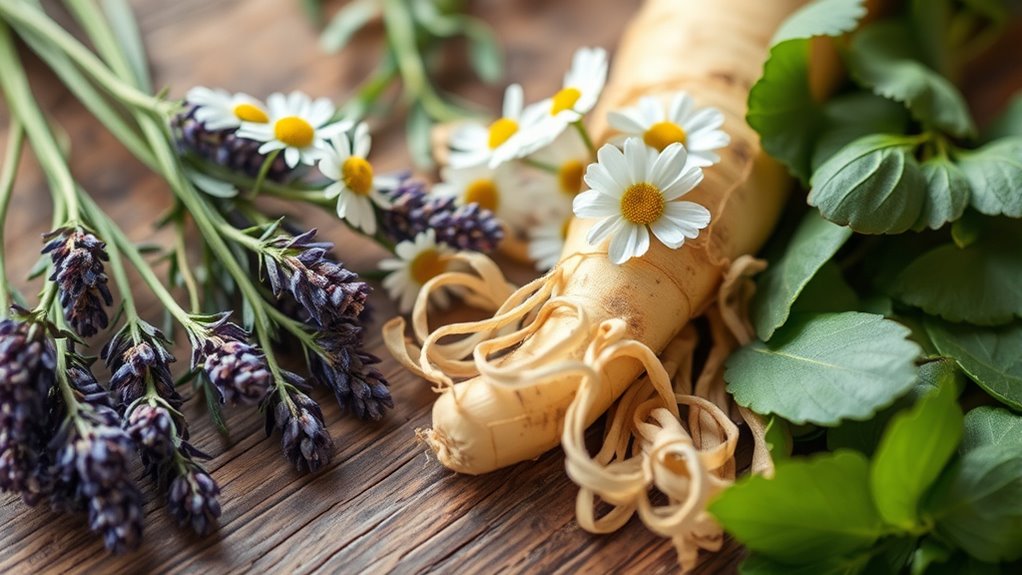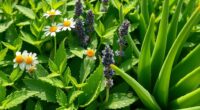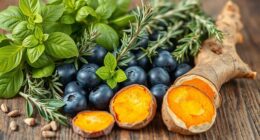Herbal options for ADHD, like ginseng, Brahmi, and Valerian root, may help boost focus and promote calmness, but it’s important to choose carefully. Not all herbal products are regulated, and some can interact with medications or cause side effects. Always consult a healthcare professional before starting any herbal supplements and verify you get them from reputable sources. To discover how to use these herbs safely and effectively, continue exploring the options available.
Key Takeaways
- Ginseng and Brahmi are traditionally used to enhance focus by improving cognitive function and increasing brain blood flow.
- Valerian root may promote calmness and reduce anxiety, supporting emotional regulation in ADHD.
- Herbal remedies should be used under professional guidance to avoid interactions and ensure proper dosage.
- Sourcing herbs from reputable suppliers minimizes risks of contamination and mislabeling.
- Herbal options can complement standard treatments but should not replace professional medical advice.

Are herbal options a safe and effective alternative for managing ADHD symptoms? Many people turn to natural remedies in hopes of finding relief without the side effects often associated with pharmaceuticals. While herbal remedies can offer benefits, it’s essential to consider herbal safety and understand that not all products are created equal. When you explore herbal options, you want to guarantee you’re choosing high-quality, reputable sources, as the market is unregulated and contaminated products can pose risks. Proper herbal safety involves knowing the correct dosages, potential interactions with other medications, and understanding how your body responds to different herbs. Consulting with a healthcare professional before starting any herbal supplement is the best way to minimize risks and guarantee that the remedies you select are appropriate for your specific needs.
Many herbal remedies are believed to help with focus, calmness, and overall mental clarity. For example, herbs like ginseng and Brahmi have been used traditionally to improve concentration and mental stamina. These herbs are thought to support cognitive function by increasing blood flow to the brain and reducing mental fatigue. Another popular herb is valerian root, often used to promote calmness and reduce anxiety, which can be particularly helpful for those with ADHD who experience restlessness or difficulty settling down. Keep in mind, though, that the effectiveness of these herbs varies from person to person, and scientific evidence supporting their use is often limited or preliminary. Additionally, some herbal formulations may contain multiple herbs, which can increase the risk of interactions or side effects, emphasizing the importance of professional guidance.
When you’re considering natural remedies, it’s crucial to evaluate herbal safety first. Not all herbs are suitable for everyone, especially if you have underlying health conditions or are taking other medications. For instance, some herbs can interact negatively with blood thinners or antidepressants, leading to unwanted side effects. Additionally, herbal supplements are not regulated as strictly as pharmaceuticals, so contamination or incorrect labeling can be a concern. This is why sourcing from reputable suppliers and reading labels carefully is essential. Always start with a low dose and monitor how your body reacts. If you experience adverse effects, discontinue use immediately and seek medical advice.
Choosing herbal options for ADHD management involves balancing potential benefits with the safety considerations. While natural remedies may offer a gentler alternative, they still require responsible use and proper guidance. Remember, herbal safety should always be your priority, and no supplement should replace professional treatment unless advised by a healthcare provider. When used wisely, these herbs can complement other strategies to help improve focus and calmness, making them worth exploring under expert supervision.
Frequently Asked Questions
Are Herbal Remedies Safe for Children With ADHD?
You might wonder if herbal remedies are safe for children with ADHD. While some herbal options can support focus and calm, herbal safety varies, and not all are suitable for kids. You should always consult a healthcare professional before giving any herbal supplement, as child health is delicate. Proper guidance ensures you’re making safe choices, minimizing risks, and supporting your child’s well-being effectively.
How Long Does It Take for Herbal Treatments to Work?
You’re probably wondering how quickly herbal effectiveness kicks in, and it’s not an instant magic trick. Usually, you’ll notice some improvements within a few weeks, but it can take up to 6-8 weeks for full benefits. The treatment timeline varies based on the herb and individual response. Patience is key—herbal remedies gradually support focus and calm, turning your everyday chaos into manageable calm.
Can Herbal Options Replace Traditional ADHD Medications?
You might wonder if herbal options can replace traditional ADHD medications. While herbal efficacy varies and some people find alternative therapies helpful, they often aren’t as strong or fast-acting. It’s important to consult with a healthcare professional before making any changes. Herbal treatments can complement medication or serve as part of a broader approach, but they typically shouldn’t replace prescribed treatments without proper medical guidance.
Are There Any Side Effects Associated With Herbal ADHD Aids?
Think of herbal ADHD aids as a double-edged sword—while they can help, they also carry potential risks. You should be aware of possible side effects like allergic reactions and potential interactions with medications. Always check with your healthcare provider before starting any herbal supplement, as even natural remedies can have unintended consequences. Staying informed helps you navigate safely, ensuring you benefit without risking unnecessary side effects.
How Do I Choose the Right Herbal Supplement for My Needs?
To select the appropriate herbal supplement, consider herbal potency and dosage considerations. You should research each herb’s strength and how it affects your body, starting with the lowest effective dose. Consult a healthcare professional to ensure safety and personalized advice. Pay attention to how your body responds, and adjust the dosage accordingly, always prioritizing quality and reputable sources to find the best fit for your needs.
Conclusion
While some worry herbal remedies might lack scientific backing, many find these natural options helpful in promoting focus and calm without harsh side effects. You can confidently try herbs like ginseng or valerian, knowing they’ve been used for centuries to support mental clarity and relaxation. Remember, herbs aren’t a magic fix, but they can be a gentle complement to your overall approach. With patience and proper guidance, you might discover a soothing, natural way to manage your ADHD symptoms.










